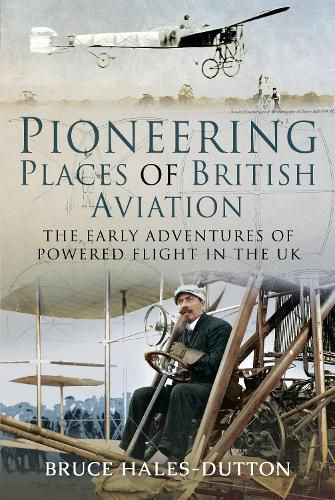Readings Newsletter
Become a Readings Member to make your shopping experience even easier.
Sign in or sign up for free!
You’re not far away from qualifying for FREE standard shipping within Australia
You’ve qualified for FREE standard shipping within Australia
The cart is loading…






From as early as the beginning of the nineteenth century, Britain was at the forefront of powered flight. Across the country many places became centres of innovation and experimentation, as increasing numbers of daring men took to the skies. It was in 1799, at Brompton Hall, that Sir George Cayley Bart put forward ideas which formed the basis of powered flight. Cayley is widely regarded as the father of aviation and his ancestral home the cradle’ of British aviation. There were balloon flights at Hendon from 1862, although attempts at powered flights from the area later used as the famous airfield, do not seem to have been particularly successful. Despite this, Louis Bleriot established a flying school there in 1910. It was gliders that Percy Pilcher flew from the grounds of Stamford Hall, Leicestershire during the 1890s. He was killed in a crash there in 1899, but Pilcher had plans for a powered aircraft which experts believe may well have enabled him to beat the Wright Brothers in becoming the first to make a fixed-wing powered flight. At Brooklands attempts were made to build and fly a powered aircraft in 1906 even before the banked racetrack was completed but these were unsuccessful. But on 8 June 1908, A.V. Roe made what is considered to be the first powered flight in Britain from there - in reality a short hop - in a machine of his own design and construction, enabling Brooklands to claim to be the birthplace of British aviation. These are just a few of the many places investigated by Bruce Hales-Dutton in this intriguing look at the early days of British aviation, which includes the first ever aircraft factory in Britain in the railway arches at Battersea; Larkhill on Salisbury Plain which became the British Army’s first airfield, and Barking Creek where Frederick Handley Page established his first factory. AUTHOR: Newspaper and magazine journalist, government press officer and aviation industry public relations specialist, Bruce Hales-Dutton’s professional career has encompassed all of these. He has worked for the government department responsible for the aviation industry, a major international airports group and a highly-respected supplier of air traffic control services as well as Britain’s aviation industry regulator. During this time, he has written text for articles, news releases, brochures and leaflets, scripts for video programmes and speeches. He now concentrates on writing books and articles about his two great loves, aviation and motor racing. Bruce is a member of the Royal Aeronautical Society and a volunteer steward at Brooklands Museum. He was born in Kent and continues to live there.
16 b/w illustrations
$9.00 standard shipping within Australia
FREE standard shipping within Australia for orders over $100.00
Express & International shipping calculated at checkout
From as early as the beginning of the nineteenth century, Britain was at the forefront of powered flight. Across the country many places became centres of innovation and experimentation, as increasing numbers of daring men took to the skies. It was in 1799, at Brompton Hall, that Sir George Cayley Bart put forward ideas which formed the basis of powered flight. Cayley is widely regarded as the father of aviation and his ancestral home the cradle’ of British aviation. There were balloon flights at Hendon from 1862, although attempts at powered flights from the area later used as the famous airfield, do not seem to have been particularly successful. Despite this, Louis Bleriot established a flying school there in 1910. It was gliders that Percy Pilcher flew from the grounds of Stamford Hall, Leicestershire during the 1890s. He was killed in a crash there in 1899, but Pilcher had plans for a powered aircraft which experts believe may well have enabled him to beat the Wright Brothers in becoming the first to make a fixed-wing powered flight. At Brooklands attempts were made to build and fly a powered aircraft in 1906 even before the banked racetrack was completed but these were unsuccessful. But on 8 June 1908, A.V. Roe made what is considered to be the first powered flight in Britain from there - in reality a short hop - in a machine of his own design and construction, enabling Brooklands to claim to be the birthplace of British aviation. These are just a few of the many places investigated by Bruce Hales-Dutton in this intriguing look at the early days of British aviation, which includes the first ever aircraft factory in Britain in the railway arches at Battersea; Larkhill on Salisbury Plain which became the British Army’s first airfield, and Barking Creek where Frederick Handley Page established his first factory. AUTHOR: Newspaper and magazine journalist, government press officer and aviation industry public relations specialist, Bruce Hales-Dutton’s professional career has encompassed all of these. He has worked for the government department responsible for the aviation industry, a major international airports group and a highly-respected supplier of air traffic control services as well as Britain’s aviation industry regulator. During this time, he has written text for articles, news releases, brochures and leaflets, scripts for video programmes and speeches. He now concentrates on writing books and articles about his two great loves, aviation and motor racing. Bruce is a member of the Royal Aeronautical Society and a volunteer steward at Brooklands Museum. He was born in Kent and continues to live there.
16 b/w illustrations